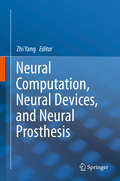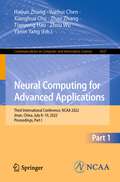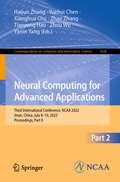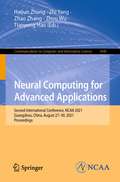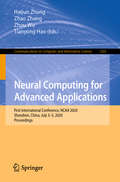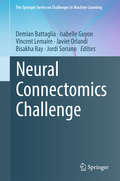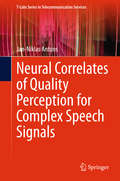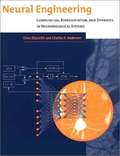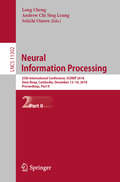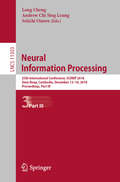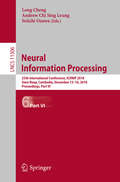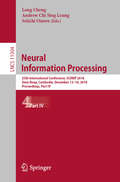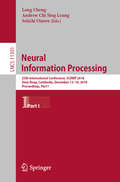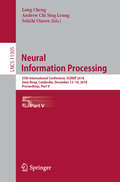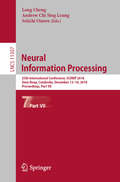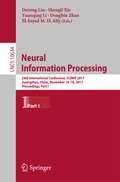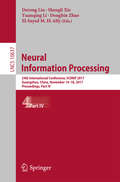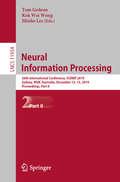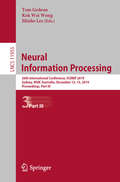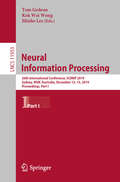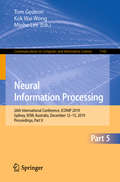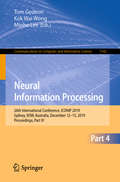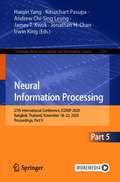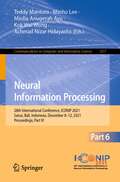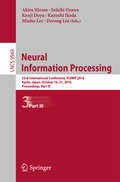- Table View
- List View
Neural Computation, Neural Devices, and Neural Prosthesis
by Zhi YangIn the past decades, interdisciplinary investigations overlapping biology, medicine, information science, and engineering have formed a very exciting and active field that attracts scientists, medical doctors, and engineers with knowledge in different domains. A few examples of such investigations include neural prosthetic implants that aim to improve the quality of life for patients suffering from neurologic disease and injury; brain machine interfaces that sense, analyze, and translate electrical signals from the brain to build closed-loop, biofeedback systems; and fundamental studies of intelligence, cognitive functions, and psychological behaviors correlated to their neurological basis. Although this interdisciplinary area is still in its infancy, it can potentially create some of the most significant impact: treating diseases that are considered untreatable, interpretation and communication of neuron ensembles, or even a revolutionary perception and understanding of life different from philosophical or immaterial approaches. Fortunately, several academic societies recognize the value and impact of this growing field, firmly supporting related research. Such support will drive a booming future in the next twenty or thirty years. Research in this area is frequently project-driven, and the generated knowledge has been scattered in different fields of neuroscience, computation, material and technology, circuits and system, clinical reports, and psychology--the scope considerably across the boundary of traditionally defined disciplines. Neural Computation, Neural Devices, and Neural Prosthesis is intended to assemble such knowledge, from there suggesting a systematic approach guiding future educational and research activities. The targeted audience includes both students and researchers.
Neural Computing for Advanced Applications: Third International Conference, NCAA 2022, Jinan, China, July 8–10, 2022, Proceedings, Part I (Communications in Computer and Information Science #1637)
by Haijun Zhang Yuehui Chen Xianghua Chu Zhao Zhang Tianyong Hao Zhou Wu Yimin YangThe two-volume Proceedings set CCIS 1637 and 1638 constitutes the refereed proceedings of the Third International Conference on Neural Computing for Advanced Applications, NCAA 2022, held in Jinan, China, during July 8–10, 2022. The 77 papers included in these proceedings were carefully reviewed and selected from 205 submissions. These papers were categorized into 10 technical tracks, i.e., neural network theory, and cognitive sciences, machine learning, data mining, data security & privacy protection, and data-driven applications, computational intelligence, nature-inspired optimizers, and their engineering applications, cloud/edge/fog computing, the Internet of Things/Vehicles (IoT/IoV), and their system optimization, control systems, network synchronization, system integration, and industrial artificial intelligence, fuzzy logic, neuro-fuzzy systems, decision making, and their applications in management sciences, computer vision, image processing, and their industrial applications, natural language processing, machine translation, knowledge graphs, and their applications, Neural computing-based fault diagnosis, fault forecasting, prognostic management, and system modeling, and Spreading dynamics, forecasting, and other intelligent techniques against coronavirus disease (COVID-19).
Neural Computing for Advanced Applications: Third International Conference, NCAA 2022, Jinan, China, July 8–10, 2022, Proceedings, Part II (Communications in Computer and Information Science #1638)
by Haijun Zhang Yuehui Chen Xianghua Chu Zhao Zhang Tianyong Hao Zhou Wu Yimin YangThe two-volume Proceedings set CCIS 1637 and 1638 constitutes the refereed proceedings of the Third International Conference on Neural Computing for Advanced Applications, NCAA 2022, held in Jinan, China, during July 8–10, 2022. The 77 papers included in these proceedings were carefully reviewed and selected from 205 submissions. These papers were categorized into 10 technical tracks, i.e., neural network theory, and cognitive sciences, machine learning, data mining, data security & privacy protection, and data-driven applications, computational intelligence, nature-inspired optimizers, and their engineering applications, cloud/edge/fog computing, the Internet of Things/Vehicles (IoT/IoV), and their system optimization, control systems, network synchronization, system integration, and industrial artificial intelligence, fuzzy logic, neuro-fuzzy systems, decision making, and their applications in management sciences, computer vision, image processing, and their industrial applications, natural language processing, machine translation, knowledge graphs, and their applications, Neural computing-based fault diagnosis, fault forecasting, prognostic management, and system modeling, and Spreading dynamics, forecasting, and other intelligent techniques against coronavirus disease (COVID-19).
Neural Computing for Advanced Applications: Second International Conference, NCAA 2021, Guangzhou, China, August 27-30, 2021, Proceedings (Communications in Computer and Information Science #1449)
by Haijun Zhang Zhi Yang Zhao Zhang Zhou Wu Tianyong HaoThis book presents refereed proceedings of the Second International Conference Neural Computing for Advanced Applications, NCAA 2021, held in Guangzhou, China, in August, 2021. The 54 full papers papers were thorougly reviewed and selected from a total of 144 qualified submissions. The papers are organized in topical sections on neural network theory, cognitive sciences, neuro-system hardware implementations, and NN-based engineering applications; machine learning, data mining, data security and privacy protection, and data-driven applications; neural computing-based fault diagnosis, fault forecasting, prognostic management, and system modeling; computational intelligence, nature-inspired optimizers, and their engineering applications; fuzzy logic, neuro-fuzzy systems, decision making, and their applications in management sciences; control systems, network synchronization, system integration, and industrial artificial intelligence; computer vision, image processing, and their industrial applications; cloud/edge/fog computing, the Internet of Things/Vehicles(IoT/IoV), and their system optimization; spreading dynamics, forecasting, and other intelligent techniques against coronavirus disease (COVID-19).
Neural Computing for Advanced Applications: First International Conference, NCAA 2020, Shenzhen, China, July 3–5, 2020, Proceedings (Communications in Computer and Information Science #1265)
by Haijun Zhang Zhao Zhang Tianyong Hao Zhou WuThis book presents refereed proceedings of the First International Conference Neural Computing for Advanced Applications, NCAA 2020, held in July, 2020. Due to the COVID-19 pandemic the conference was held online. The 36 full papers and 7 short papers were thorougly reviewed and selected from a total of 113 qualified submissions. Thes papers present resent research on such topics as neural network theory, and cognitive sciences, machine learning, data mining, data security & privacy protection, and data-driven applications, computational intelligence, nature-inspired optimizers, and their engineering applications, cloud/edge/fog computing, the Internet of Things/Vehicles (IoT/IoV), and their system optimization, control systems, network synchronization, system integration, and industrial artificial intelligence, fuzzy logic, neuro-fuzzy systems, decision making, and their applications in management sciences, computer vision, image processing, and their industrial applications, and natural language processing, machine translation, knowledge graphs, and their applications.
Neural Connectomics Challenge
by Demian Battaglia Isabelle Guyon Vincent Lemaire Javier Orlandi Bisakha Ray Jordi SorianoThis book illustrates the thrust of the scientific community to use machine learning concepts for tackling a complex problem: given time series of neuronal spontaneous activity, which is the underlying connectivity between the neurons in the network? The contributing authors also develop tools for the advancement of neuroscience through machine learning techniques, with a focus on the major open problems in neuroscience. While the techniques have been developed for a specific application, they address the more general problem of network reconstruction from observational time series, a problem of interest in a wide variety of domains, including econometrics, epidemiology, and climatology, to cite only a few. The book is designed for the mathematics, physics and computer science communities that carry out research in neuroscience problems. The content is also suitable for the machine learning community because it exemplifies how to approach the same problem from different perspectives.
Neural Correlates of Quality Perception for Complex Speech Signals
by Jan-Niklas AntonsThis book interconnects two essential disciplines to study the perception of speech: Neuroscience and Quality of Experience, which to date have rarely been used together for the purposes of research on speech quality perception. In five key experiments, the book demonstrates the application of standard clinical methods in neurophysiology on the one hand and of methods used in fields of research concerned with speech quality perception on the other. Using this combination, the book shows that speech stimuli with different lengths and different quality impairments are accompanied by physiological reactions related to quality variations, e. g. , a positive peak in an event-related potential. Furthermore, it demonstrates that - in most cases - quality impairment intensity has an impact on the intensity of physiological reactions.
Neural Engineering: Computation, Representation, and Dynamics in Neurobiological Systems
by Chris Eliasmith Charles H. AndersonFor years, researchers have used the theoretical tools of engineering to understand neural systems, but much of this work has been conducted in relative isolation. In Neural Engineering, Chris Eliasmith and Charles Anderson provide a synthesis of the disparate approaches current in computational neuroscience, incorporating ideas from neural coding, neural computation, physiology, communications theory, control theory, dynamics, and probability theory. This synthesis, they argue, enables novel theoretical and practical insights into the functioning of neural systems. Such insights are pertinent to experimental and computational neuroscientists and to engineers, physicists, and computer scientists interested in how their quantitative tools relate to the brain. The authors present three principles of neural engineering based on the representation of signals by neural ensembles, transformations of these representations through neuronal coupling weights, and the integration of control theory and neural dynamics. Through detailed examples and in-depth discussion, they make the case that these guiding principles constitute a useful theory for generating large-scale models of neurobiological function. A software package written in MatLab for use with their methodology, as well as examples, course notes, exercises, documentation, and other material, are available on the Web.
Neural Information Processing: 25th International Conference, ICONIP 2018, Siem Reap, Cambodia, December 13–16, 2018, Proceedings, Part II (Lecture Notes in Computer Science #11302)
by Long Cheng Andrew Chi Sing Leung Seiichi OzawaThe seven-volume set of LNCS 11301-11307, constitutes the proceedings of the 25th International Conference on Neural Information Processing, ICONIP 2018, held in Siem Reap, Cambodia, in December 2018.The 401 full papers presented were carefully reviewed and selected from 575 submissions. The papers address the emerging topics of theoretical research, empirical studies, and applications of neural information processing techniques across different domains. The second volume, LNCS 11302, is organized in topical sections on other neural network models, stability analysis, optimization, and supervised learning.
Neural Information Processing: 25th International Conference, ICONIP 2018, Siem Reap, Cambodia, December 13–16, 2018, Proceedings, Part III (Lecture Notes in Computer Science #11303)
by Long Cheng Andrew Chi Sing Leung Seiichi OzawaThe seven-volume set of LNCS 11301-11307, constitutes the proceedings of the 25th International Conference on Neural Information Processing, ICONIP 2018, held in Siem Reap, Cambodia, in December 2018.The 401 full papers presented were carefully reviewed and selected from 575 submissions. The papers address the emerging topics of theoretical research, empirical studies, and applications of neural information processing techniques across different domains. The third volume, LNCS 11303, is organized in topical sections on embedded learning, transfer learning, reinforcement learning, and other learning approaches.
Neural Information Processing: 25th International Conference, ICONIP 2018, Siem Reap, Cambodia, December 13–16, 2018, Proceedings, Part VI (Lecture Notes in Computer Science #11306)
by Long Cheng Andrew Chi Sing Leung Seiichi OzawaThe seven-volume set of LNCS 11301-11307 constitutes the proceedings of the 25th International Conference on Neural Information Processing, ICONIP 2018, held in Siem Reap, Cambodia, in December 2018.The 401 full papers presented were carefully reviewed and selected from 575 submissions. The papers address the emerging topics of theoretical research, empirical studies, and applications of neural information processing techniques across different domains. The 6th volume, LNCS 11306, is organized in topical sections on time-series analysis; social systems; and image and signal processing.
Neural Information Processing: 25th International Conference, ICONIP 2018, Siem Reap, Cambodia, December 13-16, 2018, Proceedings, Part IV (Lecture Notes in Computer Science #11304)
by Long Cheng Andrew Chi Sing Leung Seiichi OzawaThe seven-volume set of LNCS 11301-11307, constitutes the proceedings of the 25th International Conference on Neural Information Processing, ICONIP 2018, held in Siem Reap, Cambodia, in December 2018.The 401 full papers presented were carefully reviewed and selected from 575 submissions. The papers address the emerging topics of theoretical research, empirical studies, and applications of neural information processing techniques across different domains. The 4th volume, LNCS 11304, is organized in topical sections on feature selection, clustering, classification, and detection.
Neural Information Processing: 25th International Conference, ICONIP 2018, Siem Reap, Cambodia, December 13-16, 2018, Proceedings, Part I (Lecture Notes in Computer Science #11301)
by Long Cheng Andrew Chi Sing Leung Seiichi OzawaThe seven-volume set of LNCS 11301-11307, constitutes the proceedings of the 25th International Conference on Neural Information Processing, ICONIP 2018, held in Siem Reap, Cambodia, in December 2018.The 401 full papers presented were carefully reviewed and selected from 575 submissions. The papers address the emerging topics of theoretical research, empirical studies, and applications of neural information processing techniques across different domains. The first volume, LNCS 11301, is organized in topical sections on deep neural networks, convolutional neural networks, recurrent neural networks, and spiking neural networks.
Neural Information Processing: 25th International Conference, ICONIP 2018, Siem Reap, Cambodia, December 13–16, 2018, Proceedings, Part V (Lecture Notes in Computer Science #11305)
by Long Cheng Andrew Chi Sing Leung Seiichi OzawaThe seven-volume set of LNCS 11301-11307 constitutes the proceedings of the 25th International Conference on Neural Information Processing, ICONIP 2018, held in Siem Reap, Cambodia, in December 2018.The 401 full papers presented were carefully reviewed and selected from 575 submissions. The papers address the emerging topics of theoretical research, empirical studies, and applications of neural information processing techniques across different domains. The 5th volume, LNCS 11305, is organized in topical sections on prediction; pattern recognition; and word, text and document processing.
Neural Information Processing: 25th International Conference, ICONIP 2018, Siem Reap, Cambodia, December 13–16, 2018, Proceedings, Part VII (Lecture Notes in Computer Science #11307)
by Long Cheng Andrew Chi Sing Leung Seiichi OzawaThe seven-volume set of LNCS 11301-11307, constitutes the proceedings of the 25th International Conference on Neural Information Processing, ICONIP 2018, held in Siem Reap, Cambodia, in December 2018.The 401 full papers presented were carefully reviewed and selected from 575 submissions. The papers address the emerging topics of theoretical research, empirical studies, and applications of neural information processing techniques across different domains. The 7th and final volume, LNCS 11307, is organized in topical sections on robotics and control; biomedical applications; and hardware.
Neural Information Processing: 24th International Conference, ICONIP 2017, Guangzhou, China, November 14-18, 2017, Proceedings, Part I (Lecture Notes in Computer Science #10634)
by Derong Liu, Shengli Xie, Yuanqing Li, Dongbin Zhao and El-Sayed M. El-AlfyThe six volume set LNCS 10634, LNCS 10635, LNCS 10636, LNCS 10637, LNCS 10638, and LNCS 10639 constitues the proceedings of the 24rd International Conference on Neural Information Processing, ICONIP 2017, held in Guangzhou, China, in November 2017. The 563 full papers presented were carefully reviewed and selected from 856 submissions. The 6 volumes are organized in topical sections on Machine Learning, Reinforcement Learning, Big Data Analysis, Deep Learning, Brain-Computer Interface, Computational Finance, Computer Vision, Neurodynamics, Sensory Perception and Decision Making, Computational Intelligence, Neural Data Analysis, Biomedical Engineering, Emotion and Bayesian Networks, Data Mining, Time-Series Analysis, Social Networks, Bioinformatics, Information Security and Social Cognition, Robotics and Control, Pattern Recognition, Neuromorphic Hardware and Speech Processing.
Neural Information Processing: 24th International Conference, ICONIP 2017, Guangzhou, China, November 14–18, 2017, Proceedings, Part IV (Lecture Notes in Computer Science #10637)
by Derong Liu, Shengli Xie, Yuanqing Li, Dongbin Zhao and El-Sayed M. El-AlfyThe six volume set LNCS 10634, LNCS 10635, LNCS 10636, LNCS 10637, LNCS 10638, and LNCS 10639 constitues the proceedings of the 24rd International Conference on Neural Information Processing, ICONIP 2017, held in Guangzhou, China, in November 2017. The 563 full papers presented were carefully reviewed and selected from 856 submissions. The 6 volumes are organized in topical sections on Machine Learning, Reinforcement Learning, Big Data Analysis, Deep Learning, Brain-Computer Interface, Computational Finance, Computer Vision, Neurodynamics, Sensory Perception and Decision Making, Computational Intelligence, Neural Data Analysis, Biomedical Engineering, Emotion and Bayesian Networks, Data Mining, Time-Series Analysis, Social Networks, Bioinformatics, Information Security and Social Cognition, Robotics and Control, Pattern Recognition, Neuromorphic Hardware and Speech Processing.
Neural Information Processing: 26th International Conference, ICONIP 2019, Sydney, NSW, Australia, December 12–15, 2019, Proceedings, Part II (Lecture Notes in Computer Science #11954)
by Tom Gedeon Kok Wai Wong Minho LeeThe three-volume set of LNCS 11953, 11954, and 11955 constitutes the proceedings of the 26th International Conference on Neural Information Processing, ICONIP 2019, held in Sydney, Australia, in December 2019.The 173 full papers presented were carefully reviewed and selected from 645 submissions. The papers address the emerging topics of theoretical research, empirical studies, and applications of neural information processing techniques across different domains. The second volume, LNCS 11954, is organized in topical sections on image processing by neural techniques; learning from incomplete data; model compression and optimisation; neural learning models; neural network applications; and social network computing.
Neural Information Processing: 26th International Conference, ICONIP 2019, Sydney, NSW, Australia, December 12–15, 2019, Proceedings, Part III (Lecture Notes in Computer Science #11955)
by Tom Gedeon Kok Wai Wong Minho LeeThe three-volume set of LNCS 11953, 11954, and 11955 constitutes the proceedings of the 26th International Conference on Neural Information Processing, ICONIP 2019, held in Sydney, Australia, in December 2019.The 173 full papers presented were carefully reviewed and selected from 645 submissions. The papers address the emerging topics of theoretical research, empirical studies, and applications of neural information processing techniques across different domains. The third volume, LNCS 11955, is organized in topical sections on semantic and graph based approaches; spiking neuron and related models; text computing using neural techniques; time-series and related models; and unsupervised neural models.
Neural Information Processing: 26th International Conference, ICONIP 2019, Sydney, NSW, Australia, December 12–15, 2019, Proceedings, Part I (Lecture Notes in Computer Science #11953)
by Tom Gedeon Kok Wai Wong Minho LeeThe three-volume set of LNCS 11953, 11954, and 11955 constitutes the proceedings of the 26th International Conference on Neural Information Processing, ICONIP 2019, held in Sydney, Australia, in December 2019. The 173 full papers presented were carefully reviewed and selected from 645 submissions. The papers address the emerging topics of theoretical research, empirical studies, and applications of neural information processing techniques across different domains. The first volume, LNCS 11953, is organized in topical sections on adversarial networks and learning; convolutional neural networks; deep neural networks; feature learning and representation; human centred computing; human centred computing and medicine; hybrid models; and artificial intelligence and cybersecurity.
Neural Information Processing: 26th International Conference, ICONIP 2019, Sydney, NSW, Australia, December 12–15, 2019, Proceedings, Part V (Communications in Computer and Information Science #1143)
by Tom Gedeon Kok Wai Wong Minho LeeThe two-volume set CCIS 1142 and 1143 constitutes thoroughly refereed contributions presented at the 26th International Conference on Neural Information Processing, ICONIP 2019, held in Sydney, Australia, in December 2019.For ICONIP 2019 a total of 345 papers was carefully reviewed and selected for publication out of 645 submissions. The 168 papers included in this volume set were organized in topical sections as follows: adversarial networks and learning; convolutional neural networks; deep neural networks; embeddings and feature fusion; human centred computing; human centred computing and medicine; human centred computing for emotion; hybrid models; image processing by neural techniques; learning from incomplete data; model compression and optimization; neural network applications; neural network models; semantic and graph based approaches; social network computing; spiking neuron and related models; text computing using neural techniques; time-series and related models; and unsupervised neural models.
Neural Information Processing: 26th International Conference, ICONIP 2019, Sydney, NSW, Australia, December 12–15, 2019, Proceedings, Part IV (Communications in Computer and Information Science #1142)
by Tom Gedeon Kok Wai Wong Minho LeeThe two-volume set CCIS 1142 and 1143 constitutes thoroughly refereed contributions presented at the 26th International Conference on Neural Information Processing, ICONIP 2019, held in Sydney, Australia, in December 2019.For ICONIP 2019 a total of 345 papers was carefully reviewed and selected for publication out of 645 submissions. The 168 papers included in this volume set were organized in topical sections as follows: adversarial networks and learning; convolutional neural networks; deep neural networks; embeddings and feature fusion; human centred computing; human centred computing and medicine; human centred computing for emotion; hybrid models; image processing by neural techniques; learning from incomplete data; model compression and optimization; neural network applications; neural network models; semantic and graph based approaches; social network computing; spiking neuron and related models; text computing using neural techniques; time-series and related models; and unsupervised neural models.
Neural Information Processing: 27th International Conference, ICONIP 2020, Bangkok, Thailand, November 18–22, 2020, Proceedings, Part V (Communications in Computer and Information Science #1333)
by Irwin King Jonathan H. Chan Haiqin Yang Kitsuchart Pasupa Andrew Chi-Sing Leung James T. KwokThe two-volume set CCIS 1332 and 1333 constitutes thoroughly refereed contributions presented at the 27th International Conference on Neural Information Processing, ICONIP 2020, held in Bangkok, Thailand, in November 2020.*For ICONIP 2020 a total of 378 papers was carefully reviewed and selected for publication out of 618 submissions. The 191 papers included in this volume set were organized in topical sections as follows: data mining; healthcare analytics-improving healthcare outcomes using big data analytics; human activity recognition; image processing and computer vision; natural language processing; recommender systems; the 13th international workshop on artificial intelligence and cybersecurity; computational intelligence; machine learning; neural network models; robotics and control; and time series analysis. * The conference was held virtually due to the COVID-19 pandemic.
Neural Information Processing: 28th International Conference, ICONIP 2021, Sanur, Bali, Indonesia, December 8–12, 2021, Proceedings, Part VI (Communications in Computer and Information Science #1517)
by Minho Lee Kok Wai Wong Teddy Mantoro Media Anugerah Ayu Achmad Nizar HidayantoThe two-volume set CCIS 1516 and 1517 constitutes thoroughly refereed short papers presented at the 28th International Conference on Neural Information Processing, ICONIP 2021, held in Sanur, Bali, Indonesia, in December 2021.* The volume also presents papers from the workshop on Artificial Intelligence and Cyber Security, held during the ICONIP 2021. The 176 short and workshop papers presented in this volume were carefully reviewed and selected for publication out of 1093 submissions. The papers are organized in topical sections as follows: theory and algorithms; AI and cybersecurity; cognitive neurosciences; human centred computing; advances in deep and shallow machine learning algorithms for biomedical data and imaging; reliable, robust, and secure machine learning algorithms; theory and applications of natural computing paradigms; applications.* The conference was held virtually due to the COVID-19 pandemic.
Neural Information Processing
by Derong Liu Minho Lee Kazushi Ikeda Kenji Doya Seiichi Ozawa Akira Hiroseth This two-volume set constitutes the Proceedings of the 16 International Conference on Neural Information Processing (ICONIP 2009), held in Bangkok, Thailand, during December 1-5, 2009. ICONIP is a world-renowned international conference that is held annually in the Asia-Pacific region. This prestigious event is sponsored by the Asia Pacific Neural Network Assembly (APNNA), and it has provided an annual forum for international researchers to exchange the latest ideas and advances in neural networks and related discipline. The School of Information Technology (SIT) at King Mongkut's University of Technology Thonburi (KMUTT), Bangkok, Thailand was the proud host of ICONIP 2009. The conference theme was "Challenges and Trends of Neural Information Processing," with an aim to discuss the past, present, and future challenges and trends in the field of neural information processing. ICONIP 2009 accepted 145 regular session papers and 53 special session papers from a total of 466 submissions received on the Springer Online Conference Service (OCS) system. The authors of accepted papers alone covered 36 countries and - gions worldwide and there are over 500 authors in these proceedings. The technical sessions were divided into 23 topical categories, including 9 special sessions.
